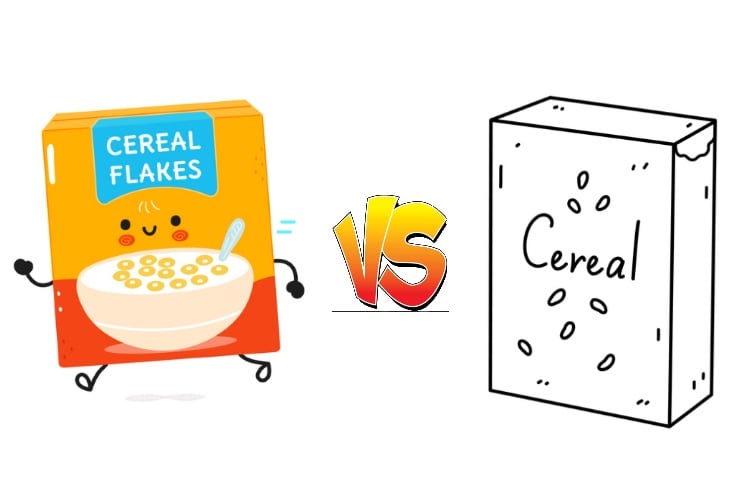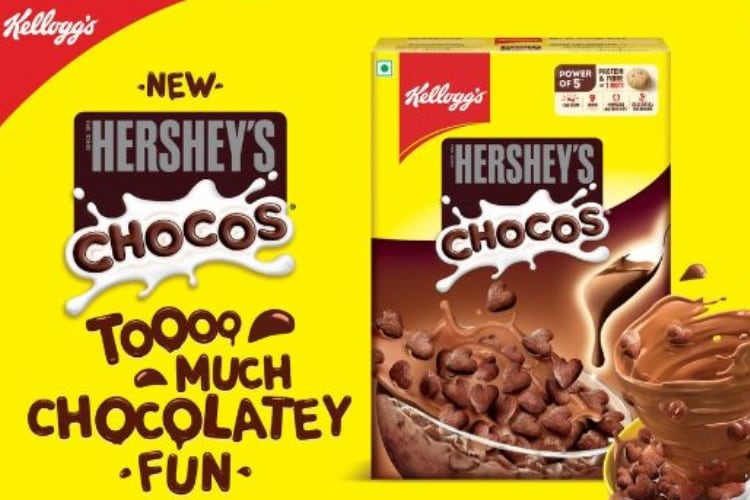Breakfast cereals saw a whopping 14.9% reduction in sugar levels between 2015 and 2020, however, the Queen Mary University of London-based organisation maintains that is not enough, noting it is way below the 20% target of the Government’s Sugar Reduction Programme.
As such, it is motivating for renewed energy and is calling for the ban of child-friendly packaging on products with high or medium levels of sugar, salt and saturated fat - which it claims is an accomplice in damaging young people’s health.
“Given the soaring numbers of under-18s suffering weight-related health problems and tooth decay being the leading cause of child hospitalisation, now is time for companies to be forced to remove child-appealing packaging from products that are misleading parents and making our children unhealthy and sick,” said Dr Kawther Hasem, campaign lead and registered nutritionist.
According to a 2022 study by Frontier Economics, the current social annual cost of obesity in the UK stood at £58bn, the equivalent to around 3% of the 2020 UK GDP.
National statistics suggests in 2022 there were 15 million+ people with obesity (BMI 30+) in the UK; 10.1% of which are reception age children (age 4-5) were obese and 23.4% of 10-11-year-olds (National Child Measurement Programme).
“Obesity is having a huge impact on economic productivity and the NHS. Drastic changes are needed to the food system and that includes responsible marketing of food and drink, especially to children,” said Graham MacGregor, Action of Sugar chair and professor of Cardiovascular Medicine at Queen Mary University of London.
They are basing their accusations on Action on Sugar’s most recent survey, which found only four cereals of the 116 products tested were low in both sugars and salt, assessed against its inclusion and exclusion criteria from October 2022 to February 2023.
The study revealed 47% of the surveyed cereals contain a third of a 4-6-year-old’s daily maximum sugar recommendation in one bowl (excluding milk), that is around 1½ tsp of the NHS’ recommended 19g (5 tsp).
The cereal makers under the spotlight
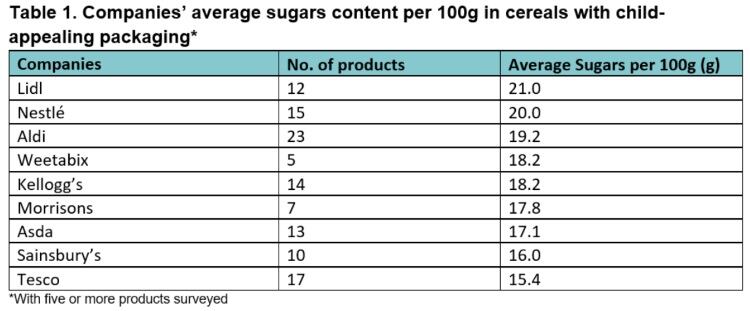
‘Evident loophole’ in HFSS regulations
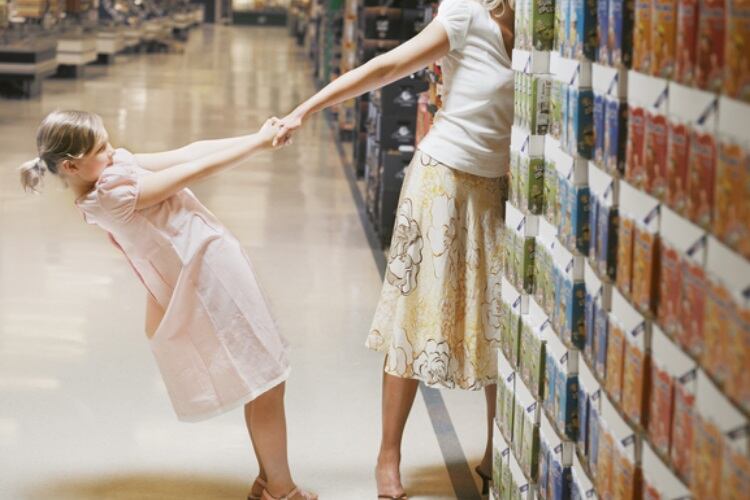
To make matters worse, Action on Sugar said the accused companies and brands use cartoon characters, animations and vibrant colours to attract a child’s attention. Coined ‘pester power’, these marketing tactics also influence the purchasing preferences of the child’s parents or guardians.
Unlike the UK government’s HFSS regulations restricting the advertising of so-called ‘unhealthy’ foods targeted at children on television, the same is not true for product packaging and the group is claiming an ‘evident loophole exists’.
“It’s ludicrous that whilst breakfast cereals and yogurts celebrate the largest reductions in sugars during the Sugar Reduction Programme, those same products with child-appealing packaging still have excessive amounts of sugars, unsuitable for regular intake by children,” said Dr Hashem.
Breaking it down

Action on Sugar’s study found Lidl, Nestlé and Aldi to have the highest sugars, on average, across their cereals targeted at children.
- Lidl Crownfield Choco Hazelnut Pillows: 28.5g sugars/100g (8.6g/2 tsp per serving)
- Nestlé Lion Caramel & Chocolate Cereal: 25g sugars/100g (7.5g/2 tsp per serving)
- Aldi Harvest Morn Honey Nut Crunchy Cornflakes: 28g sugars/100g (8.5g/2 tsp per serving)
On the other side of the coin, the study found the cereals wrapped in child-appealing packaging containing low sugars and salt were:
- Nestlé Bitesize Shredded Wheat (at the time of collection, the packaging posted a competition to win Avatar prizes and ‘virtual plants’)
- Tesco Super Smooth Porridge
- Troo Happy Porridge with Flaxseed Omega 3s and Uplifting Cinnamon
- Troo Energise Porridge with Chocolate & Maca
“There is no reason why products with high or medium levels of salt or sugar should be marketed as ‘suitable for children’,” said Zoe Davies, Action on Sugar nutritionist.
“If we are to protect the health of our future generation, then bold action is required now from both government and companies alike and this must include child-friendly packaging only being placed on healthier products.”
Action of Sugar would like to see industry redirecting ‘such visually captivating packaging strategies towards healthier food products, which are sold in plain packaging targeted at adults’, but UK Health Minister Will Quince calls this “a step too far”.
Nanny state interventions vs people empowerment
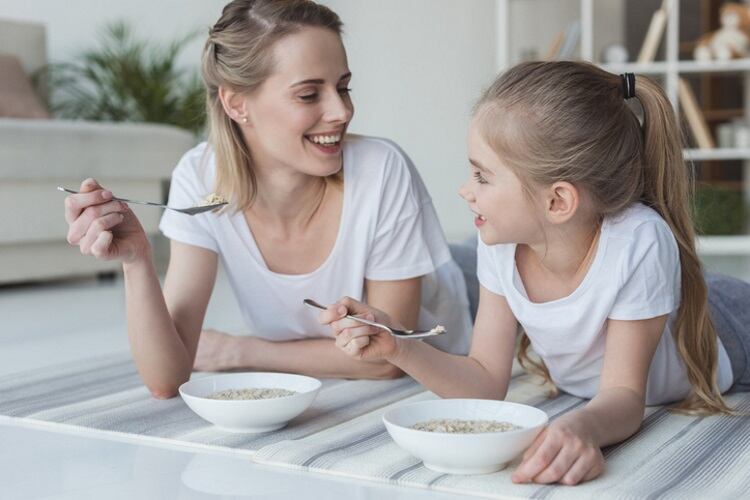
In an interview on Times Media, the UK Minister of State at the Department of Health and Social Care said, “I’m not in favour of those kinds of nanny state interventions because as a parent, it’s my responsibility to educate my child as to what is and isn’t appropriate for daily consumption and as a treat.
“What it means is we need to empower people to make healthier life choices and that means putting information like calories, sugar and salt content on the front and centre of packets.
“That is already there, but if we need to go further, we can look at that. But I think plain packaging is certainly a step too far,” said Quince.
Industry response
Bakery&Snacks reached out to the producers mentioned in the study and received comment from Kellogg UK, Nestlé and Lidl.
“We’ve worked hard to reduce sugar in our cereals since 2011,” said a Kellogg's spokesperson.
“In those cereals aimed at children, we have reduced sugar by 36% and salt by 37%, also increased fibre. All of our children's cereals are now non-HFSS (not high in fat, salt and sugar).”
In March, the UK breakfast cereal giant announced Frosties frontman Tony the Tiger is stepping back from its giant's mini multipacks - a popular product among kids - to be replaced with healthier options of Corn Flakes and Coco Pops.
A Nestlé spokesperson said it is always the producer's intention to be responsible and transparent in its marketing - and adheres to local regulations and guidelines.
“We have discussed our reformulation progress for both cereals and yoghurts with Action on Sugar and always welcome challenge and further conversations.
“Since 2003, Nestlé Cereals embarked on a significant and consistent work of reformulation, meaning 84% of the portfolio is now classed as not high in fat, salt and sugar (non-HFSS), according to the UK Government’s nutrient profiling model. That is 18 products within our cereal portfolio in the UK that are non-HFSS and contain no red traffic lights.
“We are committed to bringing choice and have a small percentage of HFSS products that can be enjoyed as part of a balanced diet."
Lidl responded to highlight that none of its own brand cereal packaging has included cartoons since spring 2020, a move, in fact, acknowledged by Action on Sugar at the time.
“If they can do it, why can’t everyone else? We hope the tide is now turning and that other retailers and food manufacturers will follow suit for both own-label and branded products,” said Katharine Jenner, Action on Sugar nutritionist.
Georgina Hall, head of Corporate Social Responsibility for Lidl, added, “We know pester power can cause difficult battles on the shop floor and we’re hoping that removing cartoon characters from cereal packaging will alleviate some of the pressure parents are under.
“This latest move underpins our commitment to making good food accessible for everyone and helping customers lead healthier lives.”
Dr Kawther Hashem, campaign lead at Action on Sugars, told this site: "Our objective with this product survey was to drive the industry towards continuous improvement. In this particular instance, our hope is to encourage Lidl to focus on using child-appealing packaging for their healthiest cereal offerings.
She added the charity praises Lidl for the changes it has made in sugar content and the removal of cartoon characters.
"We now look forward to working together to promote more positive changes in the industry."
We hadn’t received comment from others before going to print.
Action on Sugar also tested a raft of branded yoghurts and found nearly 65% also packed in a third of a 4-6-year-old’s daily maximum sugar recommendation.



